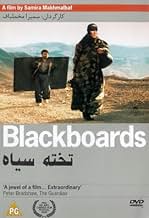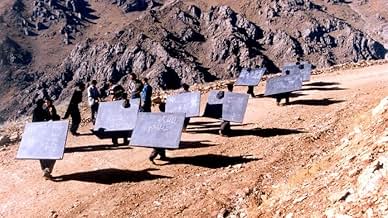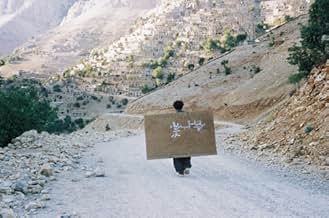IMDb RATING
6.8/10
3K
YOUR RATING
Kurdish teachers Said and Reeboir roam Iranian villages near Iraqi border during war. Said guides displaced men, marries widow Halaleh. Reeboir joins child smugglers. Amid danger, they try t... Read allKurdish teachers Said and Reeboir roam Iranian villages near Iraqi border during war. Said guides displaced men, marries widow Halaleh. Reeboir joins child smugglers. Amid danger, they try teaching nomadic students while soldiers patrol.Kurdish teachers Said and Reeboir roam Iranian villages near Iraqi border during war. Said guides displaced men, marries widow Halaleh. Reeboir joins child smugglers. Amid danger, they try teaching nomadic students while soldiers patrol.
- Director
- Writers
- Stars
- Awards
- 3 wins & 3 nominations total
- Director
- Writers
- All cast & crew
- Production, box office & more at IMDbPro
Featured reviews
This film is flawed in any number of ways - stories are unresolved; scenes of military oppression are unconvincing; and more generally I was left with a somewhat unmoved feeling when the lights came up. I thought "The apple" was a fantastic film in its challenging combination of documentary and fiction, but perhaps that an over-simplicity in "Blackboard"'s storyline was exposed by the same honest, basic direction and storytelling that made Ms Makhmalbaf's previous film really powerful.
There are definitely many positive aspects to this film as well. It fearlessly deals with one group of people (nomads who I think are Kurdish) people who really are vulnerable and at the mercy of powerful and highly suspect governments on both sides of the border. It shows that these people have a cultural strength that seems to transcend their harsh circumstances. In its other story strand it shows movingly how children, even more vulnerable, are exploited by a deregulated commercial system. Beetle-browed, bowed beneath heavy loads in the hot sun, self-defensively referring to themselves as 'mules', the kids are old before their time.
The film also has a (more or less) powerful sense of transcendental storytelling to it. The nomads are all oppressed people, looking for a promised land. The children are mythical also: the kid's story about the rabbit has an air of antiquity about it.
Neither group of oppressed people has time for the education that the main characters offer. They are too busy surviving. The use of non-actors in the film is a strength and a weakness. In a story that is more obviously fictional than "the Apple", some performances are a little wooden. But I think the emotional punch of realism, the feeling that we may in effect be watching something that is happening today somewhere in the world, more than makes up for this formal, actorly problem.
Hurriedly, then: a flawed diamond in the dust.
There are definitely many positive aspects to this film as well. It fearlessly deals with one group of people (nomads who I think are Kurdish) people who really are vulnerable and at the mercy of powerful and highly suspect governments on both sides of the border. It shows that these people have a cultural strength that seems to transcend their harsh circumstances. In its other story strand it shows movingly how children, even more vulnerable, are exploited by a deregulated commercial system. Beetle-browed, bowed beneath heavy loads in the hot sun, self-defensively referring to themselves as 'mules', the kids are old before their time.
The film also has a (more or less) powerful sense of transcendental storytelling to it. The nomads are all oppressed people, looking for a promised land. The children are mythical also: the kid's story about the rabbit has an air of antiquity about it.
Neither group of oppressed people has time for the education that the main characters offer. They are too busy surviving. The use of non-actors in the film is a strength and a weakness. In a story that is more obviously fictional than "the Apple", some performances are a little wooden. But I think the emotional punch of realism, the feeling that we may in effect be watching something that is happening today somewhere in the world, more than makes up for this formal, actorly problem.
Hurriedly, then: a flawed diamond in the dust.
I understand the vigorous debate Samira Makhmalbaf's BLACKBOARDS, has generated, but I'd also say that I loved this very demanding but often moving film - a remarkable achievement for a very young, but already accomplished filmmaker. Watching her career develop will be quite a treat.
Shot with hand-held cameras and featuring a Kurdish cast of non-actors, BLACKBOARDS is very slowly paced, with a rambling quality that captures the aimless down time of everyday life. However the restless camera work also fills the film with an unceasing tension, gradually revealing the desperation filling the stateless existances of the many nervous characters.
The politics of the region are an ever-present backdrop to the story, and unfortunate political machinations render both education and basic survival an arduous complexity - to live and to gain even the most basic of educations are made into luxuries, which - even in desolate and strife-torn landscapes - some are willing to die for.
A handful of moments stood out for me: the scenes set in the river camp showcase the warmest of human interactions, and the final scene is remarkably beautiful.
This very rigorous film (superficially reminding me of both Abbas Kiarostami and Tsai Ming-liang) nonetheless had me hooked.
Shot with hand-held cameras and featuring a Kurdish cast of non-actors, BLACKBOARDS is very slowly paced, with a rambling quality that captures the aimless down time of everyday life. However the restless camera work also fills the film with an unceasing tension, gradually revealing the desperation filling the stateless existances of the many nervous characters.
The politics of the region are an ever-present backdrop to the story, and unfortunate political machinations render both education and basic survival an arduous complexity - to live and to gain even the most basic of educations are made into luxuries, which - even in desolate and strife-torn landscapes - some are willing to die for.
A handful of moments stood out for me: the scenes set in the river camp showcase the warmest of human interactions, and the final scene is remarkably beautiful.
This very rigorous film (superficially reminding me of both Abbas Kiarostami and Tsai Ming-liang) nonetheless had me hooked.
I have nothing against slow movies -- for instance kiarostami is a huge favorite of mine. But I have to admit, this film really pushes the slow-and-obtuse envelope. it's mainly the script. the teachers encounter various nomads and desperately harangue them to hire them as teachers... when people refuse, they just repeat themselves again and again, and it seems that nobody really listens to anyone else. it's a study in harshness. it leans heavily on symbolism, and you feel that the whole thing is totally constructed by the filmmaker, that no respect at all is being paid to naturalism or the kinds of reactions that people would likely have in a situation like this. so, if you're really excited by a symbol-filled, quite stark time, you will appreciate this. I wasn't up for it.
10Red-125
This wonderful movie (shown here as "Blackboards") demonstrates the power of cinema to communicate circumstances and situations that are totally alien to those of us watching in comfort during a U.S. film festival.
The Director/Screenwriter, Samira Makhmalbaf, literally learned her trade at her father's elbow. He taught her well. Makhmalbaf was only twenty years old when she made this movie, but she has already acquired the skilled director's eye for filmmaking.
The locale in which the film is set is totally alien to me. The mountains of Iran offer stones and more stones. I believe this is the first picture I have ever seen where there is not a single image of a tree or even a green plant. The mountains are made of rocks, and the homes are made of rocks, and most of the characters in the the films spend their time climbing up, down, and between the rocks.
In this incredibly harsh, barren, non-nurturing environment, two young teachers carry blackboards on their backs and try to find someone--anyone--who wants to learn to read and write, and who can pay for this instruction.
Obviously, the teachers are motivated by their basic needs for food, water, and shelter, but--like all good teachers-- they are also motivated by the desire to teach.
Each teacher attaches himself to a group of people moving across a border. (I was never sure which border this was--I think it was from Iran to Iraq.)
Each group has endured hardship and tragedy, and their journeys are filled with the threat of danger. Despite this, the teachers continue their attempts to teach.
This movie was not only powerful, but it was informative. Anyone who thinks the mountains of Iran are more or less like the mountain meadows Julie Andrews encountered when she sang "The hills are alive with the sound of music," needs to see "Blackboards." Despite this hardship, human beings survive, and their desire to learn and to teach survives as well.
An amazing film--not to be missed!
THIS FILM WAS SEEN AT THE LITTLE THEATRE, DURING THE HIGH FALLS (ROCHESTER, NY) FILM FESTIVAL. THIS FESTIVAL IS NOT LARGE, BUT THE QUALITY OF FILMS IS OUTSTANDING. WOULD BE WORTH A SPECIAL TRIP IN 2003!
The Director/Screenwriter, Samira Makhmalbaf, literally learned her trade at her father's elbow. He taught her well. Makhmalbaf was only twenty years old when she made this movie, but she has already acquired the skilled director's eye for filmmaking.
The locale in which the film is set is totally alien to me. The mountains of Iran offer stones and more stones. I believe this is the first picture I have ever seen where there is not a single image of a tree or even a green plant. The mountains are made of rocks, and the homes are made of rocks, and most of the characters in the the films spend their time climbing up, down, and between the rocks.
In this incredibly harsh, barren, non-nurturing environment, two young teachers carry blackboards on their backs and try to find someone--anyone--who wants to learn to read and write, and who can pay for this instruction.
Obviously, the teachers are motivated by their basic needs for food, water, and shelter, but--like all good teachers-- they are also motivated by the desire to teach.
Each teacher attaches himself to a group of people moving across a border. (I was never sure which border this was--I think it was from Iran to Iraq.)
Each group has endured hardship and tragedy, and their journeys are filled with the threat of danger. Despite this, the teachers continue their attempts to teach.
This movie was not only powerful, but it was informative. Anyone who thinks the mountains of Iran are more or less like the mountain meadows Julie Andrews encountered when she sang "The hills are alive with the sound of music," needs to see "Blackboards." Despite this hardship, human beings survive, and their desire to learn and to teach survives as well.
An amazing film--not to be missed!
THIS FILM WAS SEEN AT THE LITTLE THEATRE, DURING THE HIGH FALLS (ROCHESTER, NY) FILM FESTIVAL. THIS FESTIVAL IS NOT LARGE, BUT THE QUALITY OF FILMS IS OUTSTANDING. WOULD BE WORTH A SPECIAL TRIP IN 2003!
Beautiful film about what happens when loftier ideas of learning and education meet the stark reality of day-to-day existence of nomadic Kurdish refugees.
This story moves through the dusty Iran/Iraq landscapes like a painful wheeze, yet compels you stay on the path, mindful of every step.
I find this especially moving now, during these gut-wrenching times in which we live, and considering the US's tattered and torn relationship with the people of the Middle East.
If you're looking for star power, look elsewhere. I've not seen or heard of any of these actors, but I was completely satisfied with their genuine performances. This film is also subtitled, so some may consider that a deterrent but I didn't because the pacing of this movie allowed for it.
Definitely worth a view, especially if you are a person who enjoys films that juxtapose the behavior of mankind vs. the human spirit.
peace.
This story moves through the dusty Iran/Iraq landscapes like a painful wheeze, yet compels you stay on the path, mindful of every step.
I find this especially moving now, during these gut-wrenching times in which we live, and considering the US's tattered and torn relationship with the people of the Middle East.
If you're looking for star power, look elsewhere. I've not seen or heard of any of these actors, but I was completely satisfied with their genuine performances. This film is also subtitled, so some may consider that a deterrent but I didn't because the pacing of this movie allowed for it.
Definitely worth a view, especially if you are a person who enjoys films that juxtapose the behavior of mankind vs. the human spirit.
peace.
Did you know
- ConnectionsFeatured in Samira cheghoneh 'Takhté siah' rol sakht (2000)
- How long is Blackboards?Powered by Alexa
Details
Box office
- Gross US & Canada
- $23,520
- Opening weekend US & Canada
- $3,416
- Dec 8, 2002
- Gross worldwide
- $41,772
Contribute to this page
Suggest an edit or add missing content






















